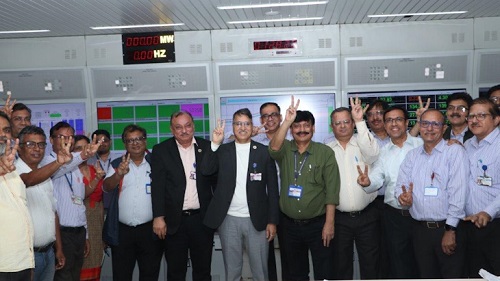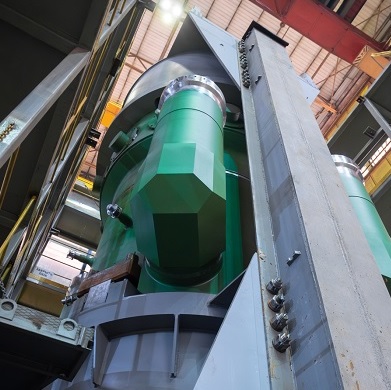 |
||
|
KAPP-4 achieves first criticality NPCIL, PUBLISHED 18.12.2023 The Unit 4 of Kakrapar Atomic Power Project (KAPP 4 - 700 MW) achieved the important milestone of Criticality (start of controlled fission chain reaction) for the first time. CONTINUED BELOW (c) NPCIL  The criticality was achieved after meeting all the stipulations of the Atomic Energy Regulatory Board (AERB), which had issued clearance after a rigorous review of safety of the plant systems. KAPP-4 is the second in the series of sixteen indigenous Pressurised Heavy Water Reactors (PHWR) of 700 MW each being set up in the country. The event was witnessed by Shri B.C.Pathak, CMD, NPCIL, who was present in thecontrol room of the station with the site team. Officials at Headquarters witnessed the event through video link. Addressing the officials at the site and headquarters after the event, CMD NPCIL congratulated all the employees of NPCIL. He said that achievement of criticality of KAPP-4, within six months of commercial operation of Unit-3 was a significant achievement. Together with the smooth operation of KAPP-3, it demonstrated the strength of NPCIL in all facets of nuclear power viz. design, construction, commissioning and operation. He urged everyone to work towards rapid completion of the units under construction. After the first criticality, several experiments / tests will be conducted in KAPP-4 and the power level raised in steps, in line with the clearances of the Atomic Energy Regulatory Board (AERB), ultimately culminating in operation of the unit at full power. KAPP 3&4 (2X700 MW) are located at Kakrapar in Surat district of Gujarat, adjacentto the existing reactors KAPS 1&2 (2X220 MW). These indigenous PHWRs have advanced safety features and are among the safest reactors in the world. While these reactors have been designed, constructed, commissioned and operated by NPCIL, the supply of equipment and execution of contracts have been by Indian industries / companies, and thus the true reflection of the spirit of AtmaNirbhar Bharat. NPCIL presently operates 23 reactors with a total capacity of 7480 MW and has nine units (including KAPP-4) with a capacity of 7500 MW under construction. In addition, 10 more reactors with a total capacity of 7000 MW are in pre-project activities. These are expected to be completed progressively by 2031-32. Topics: Commissioning, Asia, India, PHWR Other news: HTR-PM starts commercial operation It is an important pathway for optimizing energy structure, ensuring reliable energy supply, and contributing to the dual carbon goal. Lepse Floating Technical Base Dismantlement Project has been successfully implemented To discharge spent nuclear fuel, the Lepse was placed in a specially designed and built onshore sheltering site. This made it possible to prevent any weather effects. IAEA has issued a technical document on global inventories of secondary uranium supplies The document provides a comprehensive assessment of publicly available information on current secondary uranium supplies, including at the regional and national levels. |
Hero of the day 
ROSATOM completed production of RITM-200 for Chukotka icebreaker This is the last reactor that the company is manufacturing under the valid contract for the supply of power units for the new generation nuclear-powered ships. After having been prepared for transportation, the reactor will be delivered to the Baltic Plant. INTERVIEW
CNNC OPINION
WANO |

